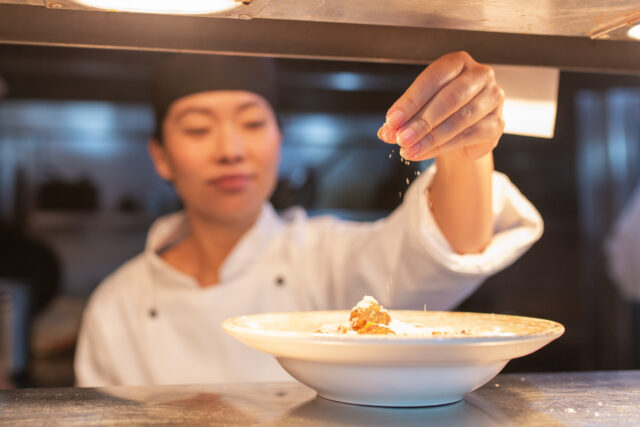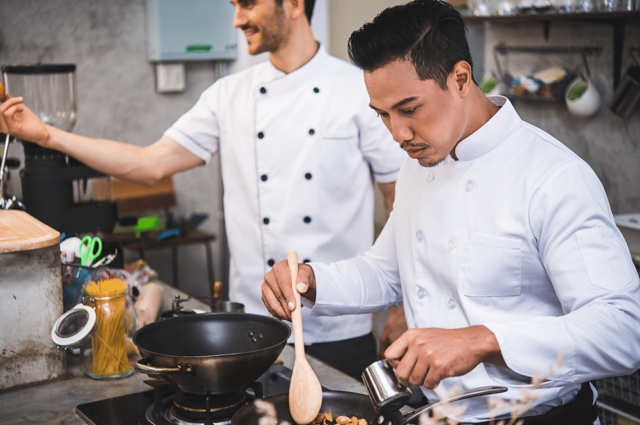
We won’t try to kid you – taking on temporary chef roles can be tough work. Hot environments, lots of shouting, the frantic pace of service, the constant cries of ‘yes chef!’…unless, of course, you’re the Head Chef.
But it’s also rewarding. You get to use your creativity on different dishes, at different venues, for all different types of guests, in all different styles from around the world.
You get the chance to work with talented teams, and climb the ladder; from Commis Chef, to Chef De Partie, to Sous Chef, and so on – the sky’s the limit.
And there’s never been a better time than the present to look for temporary chef jobs; with increasing demand in the culinary industry for those with the right set of skills to thrive in such roles.
You may find, in taking on temporary chef jobs, that you’re referred to as a ‘relief chef’ or ‘freelance chef’. But regardless of the name, the role remains the same and provides excellent opportunities for culinary professionals to gain valuable experience, expand their skill set, and showcase their talent in various kitchen environments.
So, whether you’re relatively new to the industry or an experienced professional looking for a change, landing temp chef work could be just the thing for you.
In this blog post, we’ll explore the essential skills you need to be a chef, the qualities and personal skills you’ll need, chef skill examples and chef technical skills, and anything else that will help you secure a temp chef position and flourish in this dynamic industry.
Technical skills for temp chefs

Culinary Expertise
When it comes to the required skills for a chef, culinary expertise is right up there. It’s the foundation of any successful chef career – it’s as essential as a builder knowing how to lay a brick.
Being able to demonstrate a diverse culinary skill set is vital when applying for a temporary chef job.
Employers look for candidates who can demonstrate competence in various cooking techniques, familiarity with international cuisines, have the ability to create well-balanced, flavourful dishes, and who can work with pretty much any menu.
But, culinary expertise may extend to simple things such as; do you know how to make a fresh mayonnaise from scratch?
In general though, having a strong understanding of food preparation, cooking methods, and food presentation will not only impress potential employers but also allow you to thrive in different kitchen environments – from restaurants to banqueting suites, and beyond.
Knife skills
It almost goes without saying that having your own set of knives and the required knife skills is one of the key skills for a chef.
Any chef worth their salt needs to know a variety of knife techniques, and their place in food preparation, such as:
- Chiffonade: slicing herbs/leaves into fine, ribbon-like strands
- Julienning: using confident, controlled motions
- Dicing: producing small, uniform cubes of vegetables
- Deboning or filleting meat or fish
There are many more knife skills required, but the above simply represent some examples.
But it’s not just about efficiency and speed, it’s about safety; maintaining a firm grip on the knife handle, keeping the right posture, and keeping the blade sharpened so it performs as it should.
These skills come with months, even years, of practice, but allow a chef to show a little artistry, precision, and flair in the kitchen.
Catering for different dietary requirements
It’s essential that you’re well-versed in handling various dietary requirements and allergies; catering to specific customer needs but not compromising on the quality of the food.
It can be a bit of a minefield out there. For example, some people don’t want gluten whereas some are genuinely allergic i.e. they have celiac disease and will have a reaction to gluten. There are also a whole host of other conditions out there; nut allergies, shellfish allergies, lactose intolerance, egg allergies, and so on.
And you’ll need to consider vegetarian and vegan diners.
The best thing to do, if you want to keep your temp chef skills up to date, is to know all the latest food trends and incorporate them into your repertoire.
It’s also a good idea to keep your qualifications up to date, for example by ensuring you’re certified for Food Safety Level 2 and Allergen Awareness. At Indeed Flex, we provide training for these qualifications free of charge.
Alternatively, if you’re fairly early on in your career, you could get certification through a reputable culinary school, to boost your chances of landing temp chef roles.
Work in different venues
If you want to progress quicker and learn the skills needed to be a successful chef, it’s a good idea to work in as many different environments, or venues, as possible.
Venues can range from restaurants, to banqueting suites, to events such as weddings, to small pop-ups, to stadiums, and beyond.
The more venues you can show you’ve worked at, the more in demand you’ll be from different employers – they’ll see the value you can add to their kitchen(s).
At Indeed Flex, we offer temp chef roles across a whole host of venues, with hundreds of different employers, so the more places you’ve worked, the better.
Climb the ladder
If you’re going to move up the ladder as a temp chef, it’s a good idea to have a plan of sorts: how quickly do you want to move from one level to the next? Do you, ultimately, want to be a Head Chef or a Lead Chef? If so, when do you want to reach that point?
When it comes to any kitchen, the order of hierarchy goes:
Food Prep Assistant – not yet a trained chef, but can prepare food.
Commis Chef – generally straight out of catering college, without much/any experience. You’ll need to work 1 – 2 years as a Commis Chef – always supervised.
Chef De Partie – 3 – 5 years’ experience. You’ll run sections of the kitchen e.g salads, meats, and look after the Commis Chef.
Sous Chef – this literally translates as ‘under chef’. You’ll need 5+ years’ experience, and you’ll be second in control/command of the kitchen; running the shift. You’ll make sure service goes off without a hitch, whether breakfast, lunch, or dinner.
You’ll also put in orders for stock/ingredients, make sure all the prep is done, do temp checks, and be responsible for health and safety.
Head Chef – above the Sous Chef. You’ll run the kitchen. The buck stops with you. You’ll look after profit margins, rotas, and make sure the business functions.
Lead Chef – In charge of multiple outlets e.g. the corporate boxes at football grounds. You’ll need 7+ years’ experience and will often lead multiple kitchens.
| Role | Years of experience |
| Commis Chef | 1 – 2 years |
| Chef De Partie | 3 – 5 years |
| Sous Chef | 5+ years |
| Head Chef | 5+ years |
| Lead Chef | 7+ years |
So, work out where you currently sit in the pecking order and where you want to get to over the coming months and years.
Know the basics
It’s important to know how to do certain things in the kitchen – certain things that would be expected of you in any kitchen.
This includes, for example, knowing how to create a mayonnaise from scratch, how to make hollandaise sauce, and how to make a roux, among many other things.
If you’re looking at temp chef jobs, it’s important to read the job description properly, to make sure you can do everything that’s being asked of you.
Soft skills for temp chefs

Creativity
It might be considered a soft skill, but it’s no less important than any other when working a temp chef job: creativity.
Chefs need this in spades.
Yes, at times you may be expected to follow recipes, or an existing menu, but in that instance it’ll be the little touches you show – the unexpected tweaks to what’s already there. That’s what’ll set you apart from other chefs and ensure you’re asked back time and time again.
But, aside from pre-existing menus, employers often look for chefs who can bring fresh ideas to their kitchen(s) – those with a dash of culinary genius.
Trying out new dishes or techniques – maybe experimenting a little – will show an employer just what you’re capable of and leave a lasting impression on them.
With that in mind, it’s always a good idea to keep your culinary knowledge and ideas bang up to date by attending culinary events or participating in cooking competitions or pop-up events. These will only serve to push the limits of your creativity and enhance your reputation.
Time Management
Among all of the required chef skills and qualities, this is right up there in terms of importance. The fast-paced nature of any kitchen environment demands excellent time management skills.
This is particularly the case in temp chef jobs, as you’ll often be working on short-term assignments, so being able to efficiently organise tasks, prioritise responsibilities, and meet tight deadlines is essential.
It’s also the norm to be cooking five orders or more at once. If you are, for example, on the grill, that could mean cooking 50+ steaks. You need to ensure you can keep up with the pace.
A well-structured work plan not only ensures that all dishes are prepared and served to guests in a timely manner, but also maintains kitchen efficiency during busy service periods. Punctuality is also crucial in gaining the trust and respect of your team and employer. Arriving early for shifts and demonstrating your ability to keep up with demanding schedules will leave a positive impression on all of those you work with.
To enhance your time management skills, consider creating checklists, and setting realistic goals for each shift or assignment. The ability to stay organised and focused, particularly in high-pressure environments, will undoubtedly contribute to long-term career success.
Stress Management
Working in a busy kitchen can be intense and demanding, especially in temp chef roles, where you may not have the benefit of long-term team bonding. Demonstrating the ability to handle pressure and maintain composure during busy service periods or challenging situations will show off your professionalism and capabilities.
Stress management techniques can vary from person to person, but could include deep breathing exercises, use of organisational tools, and maintaining a positive attitude, whatever is thrown your way.
It’s also essential to recognise the signs of burnout and take appropriate measures to recharge. Engaging in hobbies outside of work, exercising regularly, and seeking support from friends and family can help to give you a healthy work-life balance. Ultimately, your wellbeing comes first, as a busy chef.
Teamwork
Another one among the key skills for a temp chef is the ability to work in a team.
A busy kitchen is a collaborative environment, where things only run smoothly when everyone is pulling together, in the same direction.
In this kind of environment, chefs of all levels should be working together harmoniously, swapping ideas and techniques, and pushing one another to produce the best food possible.
There should be a sense of camaraderie and unity, and this should come from the leadership skills exhibited by the senior chefs in the kitchen, in motivating all staff.
This should lead to seamless service, where guests can only marvel at how their needs are catered for and the culinary delights on offer.
Adaptability
Working as a temp chef, you’ll be exposed to different kitchens, menus, recipes, and teams. Therefore, the ability to adapt quickly to new environments is highly valued, and will always make you stand out as a candidate.
You’ll often face unique challenges, such as varying kitchen layouts, different cooking equipment, and team members with distinct working styles. Demonstrating your adaptability, with reference to past experiences, during the interview process will greatly increase your chances of landing the job.
Going ahead and proving your adaptability, on the job, will almost certainly mean you’re asked to work for that employer again.
Communication Skills
Of all the necessary skills for a chef, this is probably at the top of the list.
Effective communication is of paramount importance in any professional kitchen.
As a temp chef, you’ll be working with new teams on a regular basis, so communication needs to be clear and concise. You have to be able to convey your ideas and work harmoniously with others for service to run as it should.
You’ll need to quickly establish a rapport with your new colleagues and actively listen to them and their concerns, to foster a collaborative and supportive work environment.
Make sure you provide regular feedback or ask for clarification when needed.
Outside of the kitchen, you’ll also need to communicate effectively with customers at times, so a friendly and professional demeanour is essential, often leading to positive reviews and potential referrals for future temp chef jobs.
And don’t forget, communication is a two-way street, so you’ll need to employ active listening skills to make sure you’re offering the best service possible.
So, to be king of the kitchen…
Landing a temp chef job requires a combination of technical skills, culinary know-how, expertise, creativity, and adaptability. By focusing on both the hard and soft skills outlined above, and continuously improving, you’ll increase your chances of landing temporary chef positions and building a successful career in the culinary industry.
Embrace each opportunity to showcase your talents, learn from different culinary environments and fellow chefs, and network with industry professionals. Remember that every temporary assignment is a stepping stone towards a better future for you as a chef. With the right skills and attitude, you can flourish as a temp chef and build a long-standing career in the ever-evolving world of gastronomy.
To continue on your culinary journey and gain experience across all kinds of venues, with all different cuisines, download the Indeed Flex app today.

